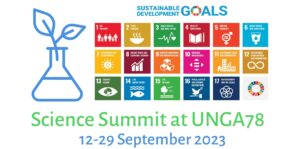Members of the Belmont Forum Secretariat participated and facilitated in multiple panel discussions across the three weeks of the Science Summit at the 78th UN General Assembly (SSUNGA78). We are so appreciative for the many panelists who contributed to the many rich and fruitful conversations we participated in.
Below we recap how members of the Secretariat represented and shared the values represented within the Belmont Challenge.
Developing Equitable Partnership for Open Science and Innovation in the Era of AI
Building Equitable partnerships requires science equity, to achieve this, we need to ensure that future programs include equitable partnership principles as integral to the core of its mission, vision, and programmatic strategy. To learn more about the outcomes of this panel, read more…
Perspectives on Climate Justice and Cultural Diversity: A Dialogue South-North
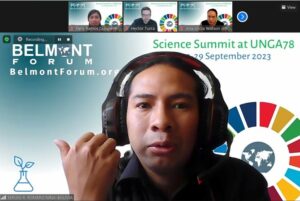 The concept of Climate Justice serves as a catalyst for a set of demands and claims made by countries in the Global South and historically excluded groups also in the North, within the context of the historical responsibilities that the western capitalists countries hold in the current climate and environmental crisis. Climate justice entails multiple meanings linked to economic, social, cultural, and symbolic dimensions, often involving different interpretations depending on the contexts whether they are scientific, political, indigenous communities, local communities, or society at large.
The concept of Climate Justice serves as a catalyst for a set of demands and claims made by countries in the Global South and historically excluded groups also in the North, within the context of the historical responsibilities that the western capitalists countries hold in the current climate and environmental crisis. Climate justice entails multiple meanings linked to economic, social, cultural, and symbolic dimensions, often involving different interpretations depending on the contexts whether they are scientific, political, indigenous communities, local communities, or society at large.
This session opened a space for discussion to reflect on the multiple dimensions – economic, social, cultural, and symbolic-encompassed by the concept of Climate Justice in a multicultural dialogue South-North. Panelists focused on different experiences, challenges, and opportunities that this concept presents helping us all rethink the importance of cultural and epistemological diversity and the promotion of greater integration between science and traditional knowledge to move towards a more just and sustainable world. Recording available here.
Panelists included:
- Sergio Richard Romero Nina, Coordinator Colectivo La Thojpa-Declaratória de Juventudes por el Lago Titicaca (Perú-Bolivia)
- Ana Alicia Watson Jimenez, Postdoctoral Associate, University of Calgary
- Hector Turra Chico, University of Calgary
- Dan Wildcat, Principal Investigator, RVCC Hub; Haskell Indian Nations University
- María Inés Carabajal, STeP Fellow, Inter-American Institute for Global Change Research (IAI)
- Fany Ramos Quispe, IAI STeP Fellow at the Belmont Forum, ED ai. CADEC
Towards inclusivity in international method development for biodiversity assessment
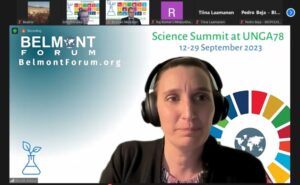 This session explored the importance of fostering and supporting an inclusive method development practice in developing the standards that will be used for international biodiversity assessments – which will be required for nations to report on their contributions to the Kunming-Montreal Global Biodiversity Framework. In these discussions BF ED (me) underlined the importance of understanding the context in which different communities live, work and collect the data required for biodiversity monitoring. In the context of sequence information and genetic resources (which was the focus of this discussion) this includes being aware of resources available for the collection, storage and transport of samples, defining the uses, sharing and archiving of the samples and data once collected, and also (importantly) the safely and security of those tasked with collecting the samples – which may need to take place, in many of our most biodiverse regions, under hostile circumstances (political, or due to various types of conflict). Working collaboratively, in an international context will be key to effectively setting developing agreed upon methodologies that will allow us to effectively understand and monitor global biodiversity.
This session explored the importance of fostering and supporting an inclusive method development practice in developing the standards that will be used for international biodiversity assessments – which will be required for nations to report on their contributions to the Kunming-Montreal Global Biodiversity Framework. In these discussions BF ED (me) underlined the importance of understanding the context in which different communities live, work and collect the data required for biodiversity monitoring. In the context of sequence information and genetic resources (which was the focus of this discussion) this includes being aware of resources available for the collection, storage and transport of samples, defining the uses, sharing and archiving of the samples and data once collected, and also (importantly) the safely and security of those tasked with collecting the samples – which may need to take place, in many of our most biodiverse regions, under hostile circumstances (political, or due to various types of conflict). Working collaboratively, in an international context will be key to effectively setting developing agreed upon methodologies that will allow us to effectively understand and monitor global biodiversity.
Advancing a dialogue between Indigenous and Western legal frameworks related to Environmental Challenges
 The session consisted of four talks representing different approaches to bridging communities as well as the underlying contextual differences between Indigenous and Western law, illustrated through two case studies (Canada and Bolivia). Discussion amongst the panelists and moderator yielded many great insights, including:
The session consisted of four talks representing different approaches to bridging communities as well as the underlying contextual differences between Indigenous and Western law, illustrated through two case studies (Canada and Bolivia). Discussion amongst the panelists and moderator yielded many great insights, including:
- Recognize the differing hierarchies underlying Indigenous and Western laws, importantly the role of humans in managing the ecosystem. Indigenous peoples manage less than 5% of the Earth’s landscape but more than 80% of its biodiversity in part because their management practices are informed by the outcomes of the ecosystem (in contrast to Western management where human decisions often determine ecosystem outcomes).
- To move forward equitably, we need to acknowledge the great diversity of Indigenous laws and norms within Western jurisdictions
The Inter-American Institute for Global Change Research (IAI), an international governmental organization representing 19 nations within the Americas, and host of the Belmont Forum, facilitates multilateral research projects focus on transdisciplinary and sustainable research around global change challenges. To change how we work together, the IAI now has an Indigenous peoples advisory body that informs leadership alongside the science advisory and science policy advisory committees. Other take home messages from the panelists:
- Current scientific enterprise does not reward transdisciplinary research. We need to change the academic incentive structure (e.g., away from first-authored English language, often pay-walled journal articles) to promote use-based community driven research.
- We need to elevate Indigenous and local knowledge holders within the science-policy space.
- It is critical that we broaden the definition of expert
- We need to promote pluralism within the international governance space
Transdisciplinary approaches to working across different community contexts
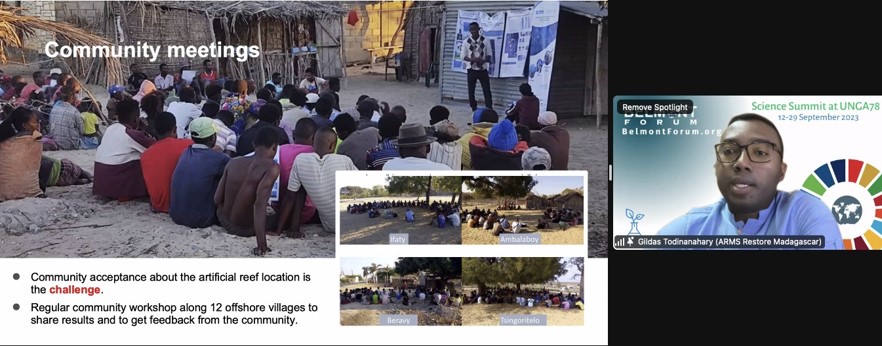 Transdisciplinary science is at the forefront of co-developing societally and legitimate solutions to current complex problems. Current Science is well known for creating its own language and academic disciplinary silos that become more exclusionary rather than inclusive. In a time of complex crisis, science needs to respond to societal complex needs. The fundamental core of transdisciplinary science is the co-production of knowledge societally relevant. The panel showcased good practices for co-designing and co-developing transdisciplinary science to address complex problems.
Transdisciplinary science is at the forefront of co-developing societally and legitimate solutions to current complex problems. Current Science is well known for creating its own language and academic disciplinary silos that become more exclusionary rather than inclusive. In a time of complex crisis, science needs to respond to societal complex needs. The fundamental core of transdisciplinary science is the co-production of knowledge societally relevant. The panel showcased good practices for co-designing and co-developing transdisciplinary science to address complex problems.
Panelists Included: Patamawadee Pochanukul (TSRI), Hugh Johnson (Drexel University), Gildas Todinanahary (IH.SM), Laila Sandronia (IAI)
Watch full session recording here.
Amazon and Tropical Forests: its global implications for a sustainable future
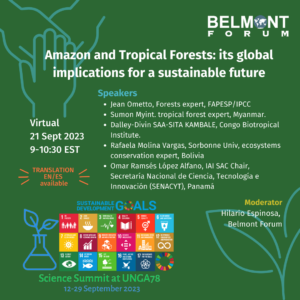 This session aimed to share advancements in research about the global implications and roles of tropical forests. The session provided an overview of the science and background of the importance of the Amazon and Tropical Forests in the world, with the speakers highlighting the need for integrating knowledge on the functioning of Tropical Forests worldwide and other socio-ecosystems, including the socioeconomic and environmental processes—to identify and implement measures to sustain and conserve the livelihoods of communities living in the Tropical Forests around the world. The panel focused on questions related to environmental justice, environmental governance, protection of indigenous peoples and local communities’ knowledge and practices.
This session aimed to share advancements in research about the global implications and roles of tropical forests. The session provided an overview of the science and background of the importance of the Amazon and Tropical Forests in the world, with the speakers highlighting the need for integrating knowledge on the functioning of Tropical Forests worldwide and other socio-ecosystems, including the socioeconomic and environmental processes—to identify and implement measures to sustain and conserve the livelihoods of communities living in the Tropical Forests around the world. The panel focused on questions related to environmental justice, environmental governance, protection of indigenous peoples and local communities’ knowledge and practices.
Speakers Included: Jean Ometto (FAPESP), Sumon Myint (Ministry of Natural Resources & Environmental Conservation of National Unity Government of Myanmar), Rafaela Molina Vargas (IRD-Sorbonne), Dalley-Divin SAA-SITA(Congo BioTropical Institute), and Omar Ramsés López Alfano (SENACYT).
Science Capacity Building for the Future: Defining the Skills Agenda
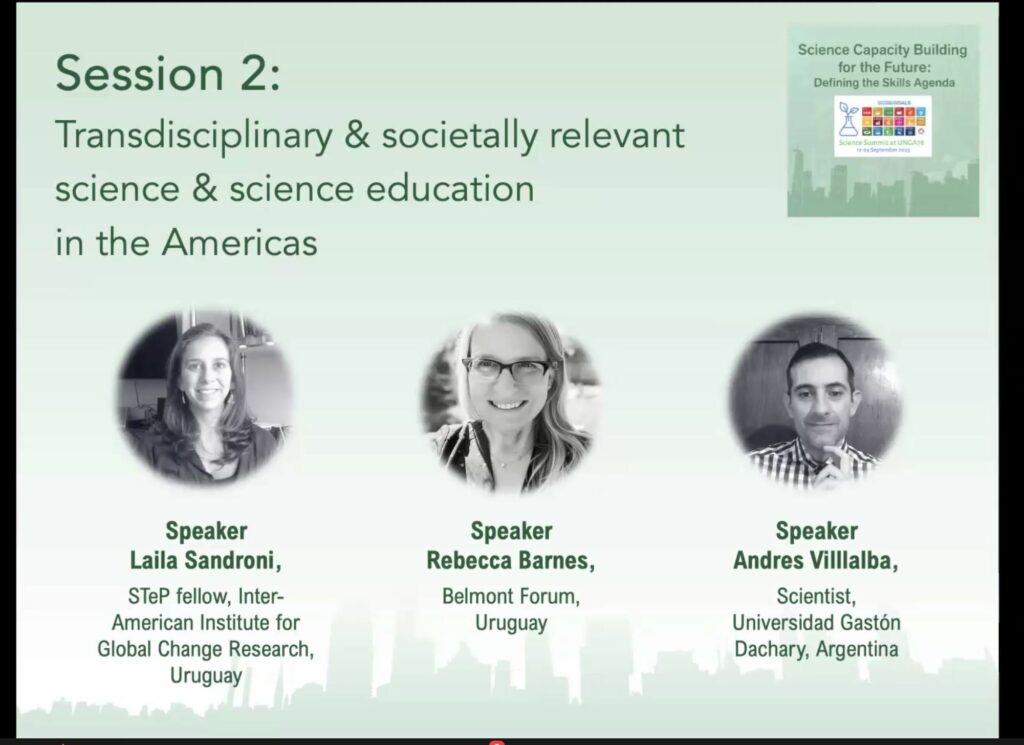 This session addressed how we can make a more inclusive approach to science capacity and skills building a critical part of the UN Summit of the Future in September 2024, as well as how we can shape novel strategies and policies to influence the next generation of scientists, innovators, and leaders in STEM and the achievement of the UN’s Sustainable Development Goal SDG 4 and the post-SDG Agenda.
This session addressed how we can make a more inclusive approach to science capacity and skills building a critical part of the UN Summit of the Future in September 2024, as well as how we can shape novel strategies and policies to influence the next generation of scientists, innovators, and leaders in STEM and the achievement of the UN’s Sustainable Development Goal SDG 4 and the post-SDG Agenda.
The growing interest in identifying future-ready human skills amidst rapid technological growth has inspired new cross-sector collaboration on education and skill development. Motivated stakeholders across the business, policy, research, and education spheres are developing roadmaps for future educational and skills efforts. The overall goal of this session was to create a platform for a transdisciplinary and global dialogue on improving and reimagining science and technology education and to motivate collective strategy-building for an equitable STEM future, ensuring every individual, regardless of background, can access opportunities. The main objective of the session was three-folded:
- Advocate for transdisciplinary science and epistemological pluralism to ensure cross-cultural knowledge exchanges and strategies for applying that knowledge.
- Identify skills needed to enhance future science capacity from local to global levels.
- Identify best practices to enhance these skill sets efficiently from local to global levels.
In advocating for a more diverse framework for future science capacity-building, the session emphasized the need to cultivate a broader range of skill sets. These undeniably encompass technological proficiencies, which remained unaddressed in this session, and skills specific to varied scientific domains. However, in this session, we advocated for an augmented emphasis on:
- Training of universal competencies or generic skills like diplomacy, perspective-taking, critical thinking, and epistemic pluralism.
- Exchanges across disciplines regarding data utilization, methodological development, and training.
- Leveraging on cultural traditions and a broader heritage of knowledge and epistemic practices.
- Cultivating a more profound understanding of localized challenges is a crucial agenda in equipping forthcoming scientists to address real-world problems in their ambient environments.
Research, Conservation & Education in a Natural Heritage Site: COIBA Scientific Station, Panama
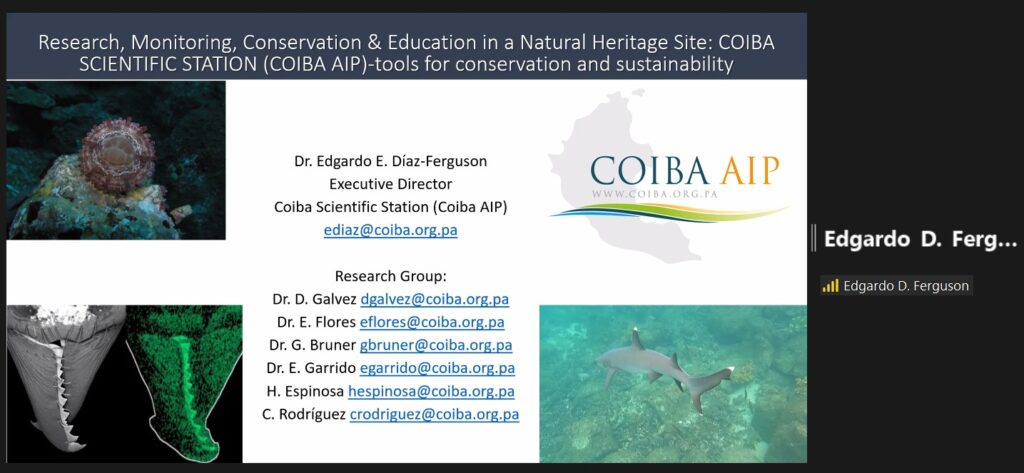 In Latin America infrastructure and human capacities for marine and coastal sciences are in early development for some countries. One of the ocean research priorities of the ocean decade 2021-2030 as well as in the 30 by 30 initiative is to create and promote local science and human local capacities for science. Located in the Pacific side of Panama, Coiba island, is the largest island in Central America and an essential part of the group of islands from Panama, Costa Rica, Colombia, and Ecuador that encompass the Eastern Tropical Pacific Marine Corridor. Created in 2018, COIBA AIP research laboratory, science station and academic center is supported by the National Secretary of Science Technology and Innovation of the Republic of Panama (SENACYT). Our main objective is to generate, execute and promote research projects, formal and environmental education and new technologies oriented to protect and study biodiversity and the sustainable use of natural resources from insular, coastal, and oceanic environments of Panama and the Eastern Tropical Pacific marine corridor. Our research station promotes and executes projects in 14 research areas including: multiple scales of biodiversity & connectivity, ecological processes, ecological restauration, sustainable fisheries, oceanography, limnology, bioprospection, coastal management, biogeography, evolutionary processes, subaquatic archeology, anthropology, and governance. COIBA AIP mission and vision consider that science should be essential part of the decision-making process related to ocean and coastal governance and effective management of coastal and oceanic areas and natural resources. We also consider important to promote open science, international and multinational collaboration. Through this talk Coiba staff scientists want to present internationally our laboratory and academic center and to promote our strategic plan, programs, activities, and opportunities for the international community.
In Latin America infrastructure and human capacities for marine and coastal sciences are in early development for some countries. One of the ocean research priorities of the ocean decade 2021-2030 as well as in the 30 by 30 initiative is to create and promote local science and human local capacities for science. Located in the Pacific side of Panama, Coiba island, is the largest island in Central America and an essential part of the group of islands from Panama, Costa Rica, Colombia, and Ecuador that encompass the Eastern Tropical Pacific Marine Corridor. Created in 2018, COIBA AIP research laboratory, science station and academic center is supported by the National Secretary of Science Technology and Innovation of the Republic of Panama (SENACYT). Our main objective is to generate, execute and promote research projects, formal and environmental education and new technologies oriented to protect and study biodiversity and the sustainable use of natural resources from insular, coastal, and oceanic environments of Panama and the Eastern Tropical Pacific marine corridor. Our research station promotes and executes projects in 14 research areas including: multiple scales of biodiversity & connectivity, ecological processes, ecological restauration, sustainable fisheries, oceanography, limnology, bioprospection, coastal management, biogeography, evolutionary processes, subaquatic archeology, anthropology, and governance. COIBA AIP mission and vision consider that science should be essential part of the decision-making process related to ocean and coastal governance and effective management of coastal and oceanic areas and natural resources. We also consider important to promote open science, international and multinational collaboration. Through this talk Coiba staff scientists want to present internationally our laboratory and academic center and to promote our strategic plan, programs, activities, and opportunities for the international community.
Co-developing and Co-implementing Heat and Health Data Resources: Identifying Best Practices and Ensuring Equitable Partnerships through Urban Heat Mapping
The session discussed the multifaceted aspects of heat and health data resources, emphasizing the importance of community involvement and equitable collaborations. Panelists from diverse backgrounds, including academia, public health agencies, local communities, and international organizations, will engage in a constructive dialogue to share their experiences, strategies, and lessons learned. If you want to watch a session recording, it can be viewed here. Key discussion points included:
- Engaging communities as key stakeholders in the co-development and co-implementation of heat and health data resources.
- Identifying effective approaches to collecting, analyzing, and sharing data on heat-related health impacts.
- Addressing data gaps and promoting data accessibility for vulnerable populations.
- Ensuring ethical considerations and privacy protection in data collection and sharing.
- Enhancing interdisciplinary collaborations to bridge gaps between climate science, public health, and community engagement.
- Fostering international partnerships and knowledge exchange to accelerate progress in heat and health research.
Check out all the session recordings on our YouTube Channel:

